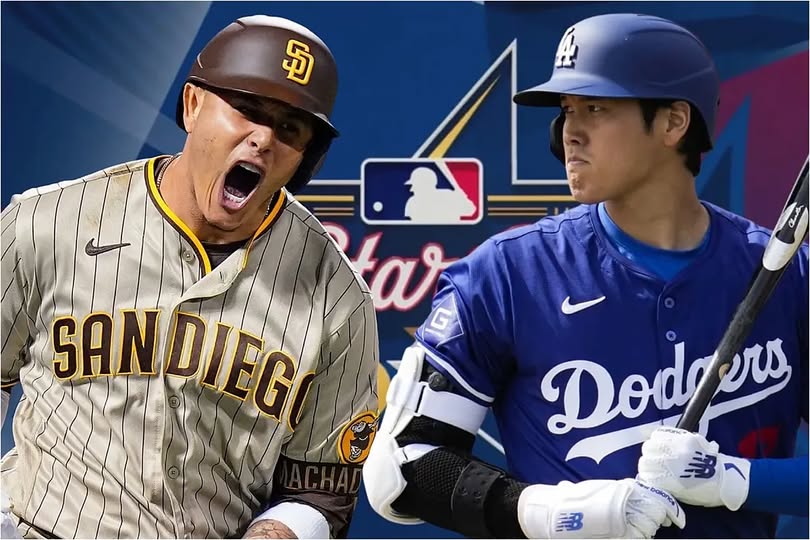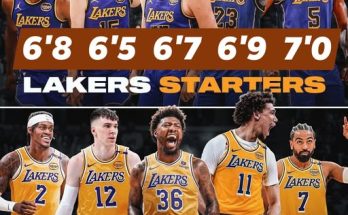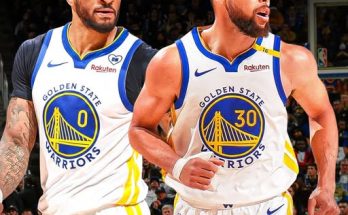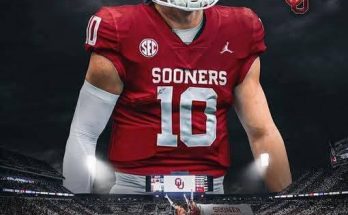In a week defined by fiery exchanges, hit‑by‑pitches, and public jabs, the Dodgers–Padres rivalry has finally invaded the hallowed grounds of baseball’s mid‑season showcase. As Manny Machado—a San Diego icon and now NL All‑Star starter—boards the bus to Truist Park in Atlanta, he’ll be surrounded not just by fans and media but by teammates of the very players he’s feuding with: Shohei Ohtani and the Dodgers.
The tension all began in mid‑June. Over the span of seven games in just 11 days, the Dodgers and Padres found conflict in every inning. Batters were plunked with alarming regularity—ten times in total, including heavyweights like Fernando Tatis Jr., Ohtani, and Dodgers’ rookie Andy Pages. It was all culminating into a showdown, and on June 19, a fastball by Dodgers rookie Jack Little struck Tatis Jr. in the ninth inning at Dodger Stadium, inciting a benches‑clearing melee involving both managers and near‑legal fireworks .
But it didn’t stop there. The very next half‑inning, Padres closer Robert Suárez answered the bell—hitting Ohtani in the back with a pitch, triggering further ejections and heat on both sides . Padres skipper Mike Shildt publicly defended his players, calling the Dodgers’ actions “enough’s enough” after repeated HBP incidents. Dodgers manager Dave Roberts, in turn, accused San Diego of “putting Shohei at risk” with intent .
This wasn’t just heat-of-the-moment flare-up; veteran voices even compared the tension to old-school rivalries. Hall of Famer Pedro Martinez likened this to Yankee–Red Sox levels of bitterness and branded it “pretty good rivalry. I am loving every bit of it” .
On top of this, bitter history looms. Back in October 2024, during the NLDS, Jack Flaherty fired at Tatis Jr., prompting Machado to lash out: “We don’t hit Shohei Ohtani; we don’t hit Fernando Tatis Jr.” Machado’s words cut deep, pointing to how sacred the rules and retribution have become between these clubs .
Fast‑forward to present day, and the drama hasn’t cooled. As team votes surged, a frenzied campaign erupted—Padres announcer Mark Grant openly urged fans to pick Machado over Dodgers’ Max Muncy for third base in the All‑Star Fan Voting, calling Machado the superior choice in a no‑holds‑barred cast of partisanship . That’s not just competition—it’s a cultural wager on pride and legacy.
The announcement on July 2 confirmed the headline: Machado is the starting third baseman for the National League. Also named alongside him is none other than Shohei Ohtani, as the designated hitter—a role he’s earned for a fifth straight time .
So now, Machado must occupy the same dugout dugout as Ohtani. In the context of baseball’s unwritten laws, that proximity is provocative. Machado adamantly declared back in October that the Padres don’t throw at Ohtani—yet he stands by his words as the conflict resurged (. And just days ago, Shildt and Roberts’s public confrontation at Dodger Stadium was evidence that tempers are far from extinguished.
Meanwhile, Ohtani entered June as the NL’s Player of the Month—.309/.398/.782 with 15 home runs—then made a surprise comeback on the mound for LA on June 16, his first pitching appearance since 2023. He was hit by the Suárez pitch a few days later—while serving both as hitter and pitcher . Just three days after that showdown, he topped the All‑Star vote with nearly four million votes—behind only Aaron Judge—locking in his DH role .
It’s not just tension; it’s drama—forged in pitch velocities, public statements, and unflinching fans on both sides. Machado frames it as defense of his star teammate: “You try to hit our best hitter… we don’t go out there and try to hit Ohtani. We try to get him out” . Meanwhile, Roberts said he “absolutely” believes San Diego’s pitchers intended to hit Ohtani in retaliation .
By July 15, Machado and Ohtani are bound to share infield drills, batting practice, the same locker room banter—all amid cameras and noise. It’s a far cry from the petulant benches‑clearing we’ve witnessed, with bad blood still simmering. Machado has made no secret of his disdain for how the Dodgers have treated his teammates and manager Mike Shildt stood by him .
This All‑Star Game will require professionalism, discipline, and perhaps strategic awkwardness. Could there be a handshake? A public handshake replay? Or will the two simply nod in passing, maintaining distance beneath the golden glow of stadium lights?
But there’s sense in the spotlight. The All‑Star Game isn’t just show—it’s a crucible for leadership under strain. Machado, already a seven‑time All‑Star and two‑time Gold Glove winner, stepped into the role of Padres’ heart and conscience during the NLDS and again this season . Now he must reconcile that bravado with the diplomacy expected of an All‑Star—amid boos, cheers, rival colors, and one of the game’s biggest ambassadors seated just feet away.
Demonstrating grace doesn’t mean weakness: sportsmanship in tension can become a statement. An olive‑branch handshake with Ohtani—or even onfield solidarity in batting practice—might shift the narrative: from simmering feud to respectful rivalry. But that handshake is already loaded.
It’s equally possible tension continues to dictate the narrative. The All‑Star Game provides a national stage. Machado could be reminded of earlier slams—wooden bench banging, words exchanged with Flaherty in the postseason. Ohtani, who has been targeted twice in the series, could still interpret Machado’s presence as defiant. For fans, the cameras will feast on even micro‑gestures.
The truth: baseball fans love tension, but they revere unity. And this roster can deliver both, if Manny Machado seizes his platform. Share a moment with Ohtani and show respect. Quietly congratulate him for his vote tally. Stand by him during introductions. An ambassador emerging from this chaos would echo louder, longer than any bench‑clear.
But the article of faith remains: in the world of baseball’s unwritten code, heat begets heat. As MLB legend Pedro Martinez observed, there’s a “Yankee–Red Sox” grudge here . Machado, wearing red and brown in April, white and blue in July, will be walking the line between tradition and transcendence.
On July 15, two-thirds of the world will watch Machado step into his role as NL third base starter. Will we see tension, politeness, or something in between—say, two capable athletes exchanging nods, a mutual respect born of fire?
What’s at stake: Machado’s legacy, Ohtani’s moment, and one of modern baseball’s most riveting rivalries will forge a new chapter—in front of family, friends, and every fan tuned in. The handshake can heal—or confirm that this rivalry isn’t going quietly.
In the end, the All‑Star Game isn’t just a game—it’s a stage. And as Machado stands alongside his adversaries, the question will echo: can a man who once yelled, “We don’t hit Shohei Ohtani,” now offer him a handshake? Or will the old animosity persist, replayed on world‑wide TV?
Either way, when the second inning begins on July 15 at Truist Park, we’ll be watching. Because for two men on that field—Manny Machado and Shohei Ohtani—this moment might define a season… or a career.



